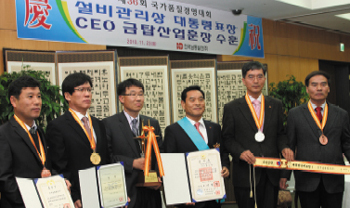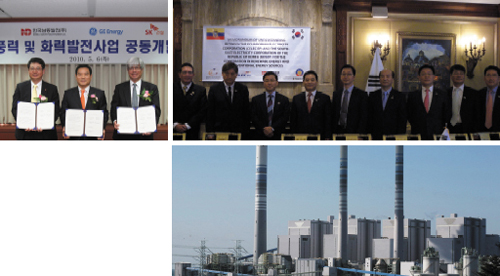KOSEP CEO Spearheads Innovation of Public Enterprises
Implements innovative management to raise productivity and save costs
 Korea South East Power Co. (KOSEP) CEO and President Jang Do-soo has been credited with transforming KOSEP into a company posting the ratio of operating profits to revenues at 9.3 percent, surpassing the average for all power companies, and surpassing efficiency indexes compared to other power companies.
Korea South East Power Co. (KOSEP) CEO and President Jang Do-soo has been credited with transforming KOSEP into a company posting the ratio of operating profits to revenues at 9.3 percent, surpassing the average for all power companies, and surpassing efficiency indexes compared to other power companies.
Jang, who once served as vice president of Samsung Corning Precision Materials, has been carrying out three management innovation strategies ¡ª unit price innovation, field innovation and process innovation ¡ª since he took the helm at the power company on Oct. 28, 2008.
First, KOSEP has introduced an autonomous management responsibility system, delegating management authority to the intrapreneur of each business division. KOSEP has set aggressive management goals and delegated such authorities as personnel management, budget and organization to the ¡°small president¡± (intrapreneur) of each business site in order to ensure responsible management. A visual planning (VP) system has been introduced to have each business site operate a management situation room so as to ensure visual management. On top of these steps, KOSEP has also been conducting the so-called ¡°10-10 Zero Campaign,¡± calling for raising productivity 10 percent, reducing unit prices by 10 percent and making KOSEP breakdown-free so as to step up competitiveness in terms of unit price by removing unessential waste.
Second, KOSEP has strengthened field-oriented innovation activities based on total productive manufacturing (TPM). Labor and management have conducted joint activities to step up the safety of equipment to reduce disasters, breakdowns and waste to zero, while each employee has been encouraged to suggest more than 18 ideas and the scientific, systematic Six-Sigma innovation program is in place to solve chronic troubles and carry out tasks.
Third, the power company has been engaged in process innovation. An enterprise resource planning (ERP) system has been built to ensure efficient information knowledge management, informational standardization and work process innovation while ¡°Tear Down & Redesign¡± activities have been ramped up for task-oriented trouble-shooting to phase out non-added value businesses.
Each KOSEP employee has been tasked with conducting innovative activities corresponding to his or her positions: the CEO is responsible for unveiling the direction of innovation and vision; cadres of 2nd Class or higher serve as an intrapreneur; those of 3rd Class work on cross-functional teams (CRTs); and employees of 4th Class or lower are charged with field-innovative TPM activities.
KOSEP has become the first public enterprise to introduce the intrapreneur system for autonomous management responsibility in which officials ranging from chief of each business to deputy general manager are assigned with duty tasks and evaluation and compensation are based on their performances. These innovative efforts have paid off: KOSEP has seen power production unit price per kWh reduce from 79.16 won in 2008 to 66.90 won, or 16 percent, and power sales have surged from 48,799GWh to 57,459GWh, a whopping 18 percent.
KOSEP posted 211.6 billion won in operating profits in 2009, a huge departure from the 139.5 billion won loss in 2008. It saw the ratio of operating profits to revenues stand at 9.3 percent, surpassing the average of 5.1 percent for all power companies, and it also achieved business performances surpassing efficiency indexes compared to other power companies, realizing the lowest coal purchase unit price and added value per capital. In addition, KOSEP broke ground for a community energy system project in Yeosu, landed a thermal power plant in Kazakhstan and made tremendous achievements in new and renewable energy fields in Korea and abroad as it has reached a target of raising its own coal exploration rate to 18 percent.
Thanks to these efforts, KOSEP was presented with the Equipment Management Award during the 36th National Quality Management Convention at Coex in Seoul on Nov. 23.
TURNING TO OVERSEAS MARKETS ¡ª CEO Jang has focused on exploring overseas markets to secure KOSEP¡¯s future breadwinners and cope with current business conditions in which the domestic power market has been saturated with lower growth rates, and international prices of anthracite and other power generation fuels have skyrocketed. KOSEP has been devoting itself to stabilizing coal supply via overseas markets, creating new profit-making projects and landing overseas plant construction orders and technology consulting service projects. Thanks to these efforts, KOSEP has earned as much as 12.6 billion won in revenues and secured the rights to explore for 3.62 million tons of anthracite annually, raising its own anthracite development rate to 18 percent.
The power company has been engaged in 17 projects ¡ª eight power plant construction, six service consulting and three anthracite development projects.
A case in focus is an anthracite development project with Adaro Energy Co. in Indonesia, in which KOSEP and KEPCO have jointly purchased a 1.5 percent stake in order to secure a stable supply of 3.62 million tons annually. Six KOSEP experts were dispatched to Bahrain in 2009 under a contract to provide technology consulting services to Al Dur. Nine other experts will be sent to India to carry out a $6 million contract on the start-up operation with Mundra.
KOSEP is seeking to actively implement plant construction projects in such emerging markets as Indonesia, Ecuador and Chile. The company is engaged in power operation and aging plant improvement projects in Saudi Arabia, Kazakhstan and Vietnam.
KOSEP is conducting a feasibility study on the construction of a biomass power plant with a capacity of 9.69MW using chaff from a rice-polishing mill in Phayao, Thailand. KOSEP would be given the rights for operation and maintenance for at least 25 years, creating a certificated emissions reduction (CER) of 30,000 tons per year.
KOSEP plans to step on the gas to implement overseas projects so as to secure future growth engines with the goal of posting 800 billion won in sales overseas and raising its own anthracite development rate to 50 percent by 2020. nw
KOSEP President Jang Do-soo is honored with Order of Industrial Service, Gold Tower during the 36th National
Quality Management Convention. KOSEP also received the Equipment Management Award.
(clockwise) KOSEP joins hands with GE and SK in the development of wind power and thermal power overseas,; KOSEP has agreed with Ecuador to develop a wind farm,; and a view of the Yeongheung Thermal Power Complex.
3Fl, 292-47, Shindang 6-dong, Chung-gu, Seoul, Korea 100-456
Tel : 82-2-2235-6114 / Fax : 82-2-2235-0799